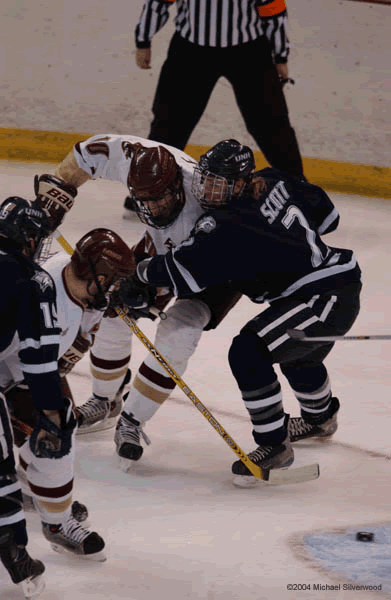November
2, 2004
Postcard:
More Whistles, More Problems?
By
Mike Eidelbes
Notre Dame
coach Dave Poulin wore a yellow “Live Strong” wristband
on his right arm following his team’s win against Boston
College last month. He’s just one of millions sporting the
baubles, a wildly successful campaign spearheaded by cyclist Lance
Armstrong to raise money for cancer research.
The mantra
inscribed upon the wristband might serve a different purpose for
Poulin and his peers across the nation. With the emphasis on rules
enforcement this season – which the NCAA and conference
commissioners hopes will lead to a more wide-open game –
noticeably changing the face of the game, the resolve of coaches
will be tested constantly.
 |
| The
NCAA wants to cut out actions like the one pictured above,
but coaches and players feel the effort has created other
dilemmas. (Photo by Michael Silverwood) |
“I understand
the intent and direction and I’m extremely hopeful we find
some common ground,” an exasperated Poulin said moments
after the Irish upset the Eagles in a game that featured a combined
20 power plays. “There is a tremendous amount of pressure
on the referees, there’s a tremendous amount of pressure
on the players and there’s a tremendous among of pressure
on the coaches.”
The strains
on players and coaches are obvious. In the vast majority of cases
through the first three weeks of the season, special teams play
comprises about half of an average game. For a coach like Poulin
– whose penalty killers also see time on power play –
it means a handful of skaters are logging a majority of the minutes.
Take the BC
game as an example. During a 22-minute stretch of the first and
second periods, the Fighting Irish and the Eagles played five-on-five
for exactly 2:41. The only flow during this span was of players
to and from the penalty box.
“There’s
no flow,” Poulin said. “The real problem is that you
don’t get to play your kids. Is it taking away from other
players’ development?”
While players
who aren’t part of special teams units are finding scant
ice time, some of those logging big minutes are just as frustrated.
“I think
they’re taking it too far,” said Notre Dame sophomore
defenseman Wes O’Neill, who easily played 35 minutes against
Boston College. “I understand they’re trying to make
a point right off the bat, but I definitely think 20 penalties
in a game are way too much. They’re starting to call stuff
[where] guys running into each other and falling down is a penalty.”
Based on comments
of coaches and players, it seems that both groups are behind the
spirit of the effort. It’s the vigilance of calling penalties
– which borders on nit-picking on occasion – that
has them frustrated.
“That
doesn’t surprise me to hear that kind of comment,”
said CCHA commissioner Tom Anastos, who’s credited with
starting the rules enforcement initiative. “I know I played
in games where you thought the same thing and this was 20 years
ago.”
Recognizing
the concerns of players and coaches is one thing. And coaches
should be lauded for their support of the initiative – everyone
should be interested in promoting a better brand of hockey, but
coaches aren’t paid to entertain or put on a good show.
They’re paid to win.
Finding common
ground, as Poulin hopes, seems to be a pipe dream, based on comments
made by Hockey East commissioner Joe Bertagna last week during
an NCAA conference call with reporters to discuss rules enforcement.
“I have
no sympathy for the players if basically they’re whining
that the illegal acts they’ve gotten away with in the recent
past are now being penalized,” Bertagna said. “It’s
not like the [officials] are making things up. Almost everything
that I’ve seen called a penalty, is a penalty.”
Just about
everyone outside the commissioners’ offices and the NCAA
headquarters – coaches, players, fans – seems ready
to throw up their arms in disgust regarding the disjointed games
that are a result of a litany of penalty calls. But there are
still way too many questions to answer before declaring the initiative
a complete success or an abject failure.
Are games
now as painful to watch as the low-scoring, clutch-and-grab affairs
that have become commonplace in recent seasons? Absolutely. Has
the emphasis on rules enforcement resulted in a swing of the pendulum
to the furthest point from where it was at the end of last season?
Probably. Will the current situation get worse before it gets
better? Doubtful, but the improvement won’t happen overnight.
“It’s
tough,” Poulin said. “I’m in a tough situation
to even discuss it.”
Live
strong, indeed.